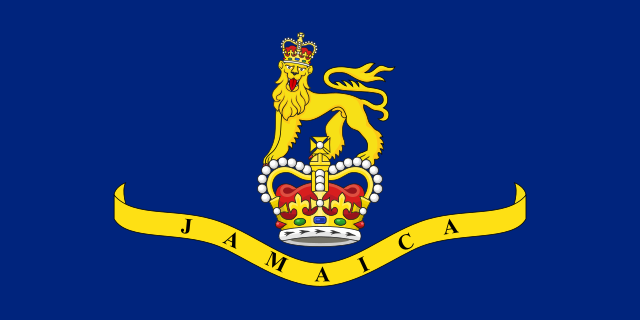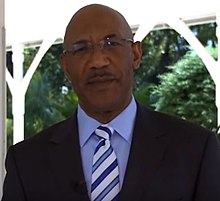Governor-General of Jamaica
Representative of the Jamaican monarch From Wikipedia, the free encyclopedia
The governor-general of Jamaica (Jamaican Patois: Gobna-Jinaral a Jumieka)[1] is the representative of the Jamaican monarch, currently King Charles III, in Jamaica. The governor-general is appointed by the monarch on the recommendation of the prime minister of Jamaica. The functions of the governor-general include appointing ministers, judges, and ambassadors; giving royal assent to legislation passed by parliament; issuing writs for election.
| Governor-General of Jamaica | |
|---|---|
| Gobna-Jinaral a Jumieka | |
 | |
 | |
| Viceroy | |
| Style | |
| Residence | King's House, Kingston |
| Appointer | Monarch of Jamaica on the advice of the prime minister |
| Term length | At His Majesty's pleasure |
| Constituting instrument | Constitution of Jamaica |
| Formation | 6 August 1962 |
| First holder | Kenneth Blackburne |
| Salary | JMD $10,850,512.65 annually |
| Website | www.kingshouse.gov.jm |
In general, the governor-general observes the conventions of the Westminster system and responsible government, maintaining political neutrality, and has to always act only on the advice of the prime minister. The governor-general also has a ceremonial role: hosting events at the official residence—King's House in the capital, Kingston—and bestowing honours to individuals and groups who are contributing to Jamaica and to their communities. When travelling abroad, the governor-general is seen as the representative of Jamaica and its monarch.
Governors-general formally serve "at the monarch's pleasure". Since 26 February 2009, the governor-general has been Sir Patrick Allen.
The office of the governor-general was created on 6 August 1962, when Jamaica gained independence from the United Kingdom as a sovereign state and an independent constitutional monarchy. Since then, six individuals have served as governor-general.
Appointment
The governor-general is formally appointed by the monarch of Jamaica. When a new governor-general is to be appointed, the prime minister recommends a name to the monarch, who by convention accepts that recommendation. At the installation ceremony, the new governor-general takes an oath of allegiance and an oath for the due execution of the office of governor-general.[2]
Upon the installation, the new governor-general is invested with the insignia of the Order of the Nation by the Chief Justice of Jamaica.[3]
Functions
Summarize
Perspective

Jamaica shares the person of the sovereign equally with 14 other countries in the Commonwealth of Nations. As the sovereign works and resides predominantly outside of Jamaican borders, the governor-general's primary task is to perform the monarch's constitutional duties on his or her behalf. As such, the governor-general carries out his or her functions in the government of Jamaica on behalf and in the name of the Sovereign.
The governor-general's powers and duties are derived from Section 27 to 33 of the constitution, which set out certain provisions relating to the governor-general.[4]
Constitutional role
The constitution gives the governor-general the authority to name the date of a general election, to appoint Ministers and assign them responsibilities to appoint Parliamentary Secretaries, the Attorney General, senators, privy councilors, the Chief Justice, the President of the Court of Appeal, the Director of Public Prosecutions and members of the Services Commissions. In most cases the governor-general acts in accordance with the advice of the prime minister, in some cases also after consultation with the leader of the opposition and in other cases in the recommendation of such authorities as the Services Commissions and the Privy Council.[5]
The constitutional responsibilities of the governor-general also include exercising executive authority, granting the prerogative of mercy, giving royal assent to bills, and appointing members of Service Commissions issuing Proclamations for the proroguing and summoning of Parliament, and declaring States of Emergency.[6]
After an election, it is the governor-general who formally requests the leader of the political party which gains the support of a majority in parliament to form a government. The governor-general commissions the prime minister and appoints other ministers after the election.[7]
The governor-general holds regular meetings with the prime minister, and where necessary with members of the Cabinet and the leader of the opposition.[8]
The governor-general may, in certain circumstances, exercise without—or contrary to—ministerial advice. These are known as the reserve powers.[9][10]
Ceremonial role

The governor-general's ceremonial duties include opening new sessions of parliament by delivering the Speech from the Throne, welcoming visiting heads of state, and receiving the credentials of foreign diplomats.[8]

The governor-general also confers honours and awards to Jamaicans for notable service to the community, or for acts of bravery in a specially convened ceremony at King's House on National Heroes Day.[8]
The governor-general also attends Independence Day celebrations and the Annual Armed Forces Day Parade, and participates in wreath-laying ceremonies on National Heroes Day and Remembrance Day.[6]
Community role
The governor-general provides non-partisan leadership in the community, and attends various cultural, educational and charitable events of national and local importance.[8][6]
The governor-general serves as patron of the St. John Ambulance in Jamaica. He is also patron of several other organizations such as the Jamaica Agricultural Society, the Jamaica Cancer Society and the National Road Safety Council. He is also an honorary member of the principal service clubs and is the Chief Scout of Jamaica. The governor-general is also the visitor for the University of Technology.[8]
The governor-general also conducts annual parish tours, to interact with the people, and understand the issues of interest to the Jamaican people.[8]
Privy Council
The Privy Council of Jamaica consists of six members who are appointed by the governor-general, after consultation with the prime minister.[11] The governor-general chairs meetings of the Privy Council which advises him on the exercise of the Royal Prerogative of Mercy and the discipline of the civil service, local government officers, and the police, in cases where appeals are made.[8][12]
Role in the parishes
The Governor-General is represented in each parish by a Custos Rotulorum.[8] The Custos is appointed by the governor-general on the advice of the prime minister and is a resident of the parish to which he/she is appointed, except in the case of the Corporate Area.[13]
The roles of the Custodes include receiving officials and dignitaries on an official visit in the absence of the governor-general, and receiving the governor-general when he pays official visits to the parish. The Custos also acts as the Chief Magistrate of the parish, and meets the Judge of the Circuit Court at the Court House at the opening session.[13]
Privileges
Salary
The governor-general receives an annual salary of JMD $10,850,512.65.[14][15]
Symbols

The governor-general uses a personal flag, which features a lion passant atop a St. Edward's royal crown with "Jamaica" written on a scroll underneath, all on a blue background. It is flown on buildings and other locations in Jamaica to mark the governor-general's presence.[16]
Residence
King's House in Kingston is the official residence of the governor-general of Jamaica. Built in the early 20th century, it has served as the official residence and workplace of all Jamaican governors-general since independence in 1962.[17]
List of governors-general of Jamaica
Summarize
Perspective
Following is a list of people who have served as Governor-General of Jamaica since independence in 1962.
Denotes acting governors-general
| No. | Portrait | Name (Birth–Death) |
Term of office | Monarch (Reign) | ||
|---|---|---|---|---|---|---|
| Took office | Left office | Time in office | ||||
| 1 |  |
Sir Kenneth Blackburne (1907–1980) |
6 August 1962 |
30 November 1962 |
116 days |  Elizabeth II  (1962–2022) |
| 2 |  |
Sir Clifford Campbell (1892–1991) |
1 December 1962 |
28 February 1973 |
10 years, 89 days | |
| – |  |
Sir Herbert Duffus (1908–2002) Acting Governor-General |
28 February 1973 |
27 June 1973 |
119 days | |
| 3 |  |
Sir Florizel Glasspole (1909–2000) |
27 June 1973 |
31 March 1991 |
17 years, 277 days | |
| – | Edward Zacca (1931–2019) Acting Governor-General |
31 March 1991 |
1 August 1991 |
123 days | ||
| 4 |  |
Sir Howard Cooke (1915–2014) |
1 August 1991 |
15 February 2006 |
14 years, 198 days | |
| 5 |  |
Sir Kenneth O. Hall (b. 1941) |
15 February 2006 |
26 February 2009 |
3 years, 11 days | |
| 6 |  |
Sir Patrick Allen (b. 1951) |
26 February 2009 |
Incumbent | 15 years, 362 days | |
 Charles III  (2022–present) | ||||||
See also
References
External links
Wikiwand - on
Seamless Wikipedia browsing. On steroids.

